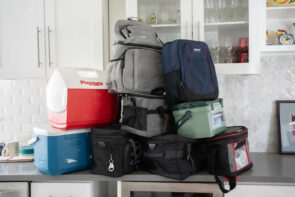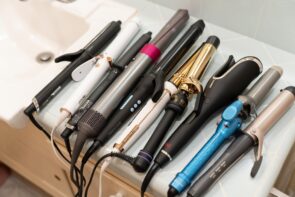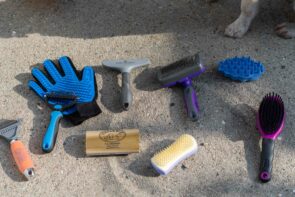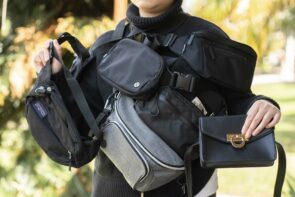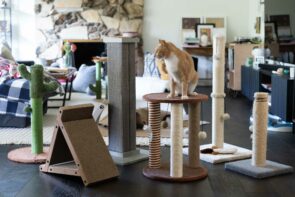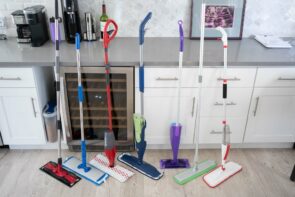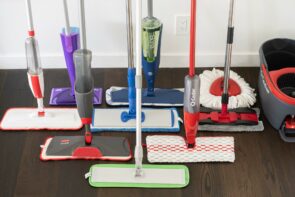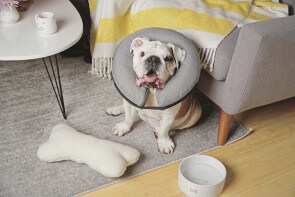
Litter-Robot 4 vs. 3 Comparison: We Tested Both!
After our positive experience with the Litter-Robot 3 Connect for many years, we were excited to test out the new Litter-Robot 4 to see if it could get any better. The new Litter-Robot 4 boasts new patented technology like its OmniSense™ Detection, which has laser and weight sensors to track your cat’s health via a mobile app and a quieter sifting cycle. We tested the Litter-Robot 4 for over six months and compared this experience with our original Litter-Robot 3 Connect to see if it was worth the hefty price hike.
Why trust us?
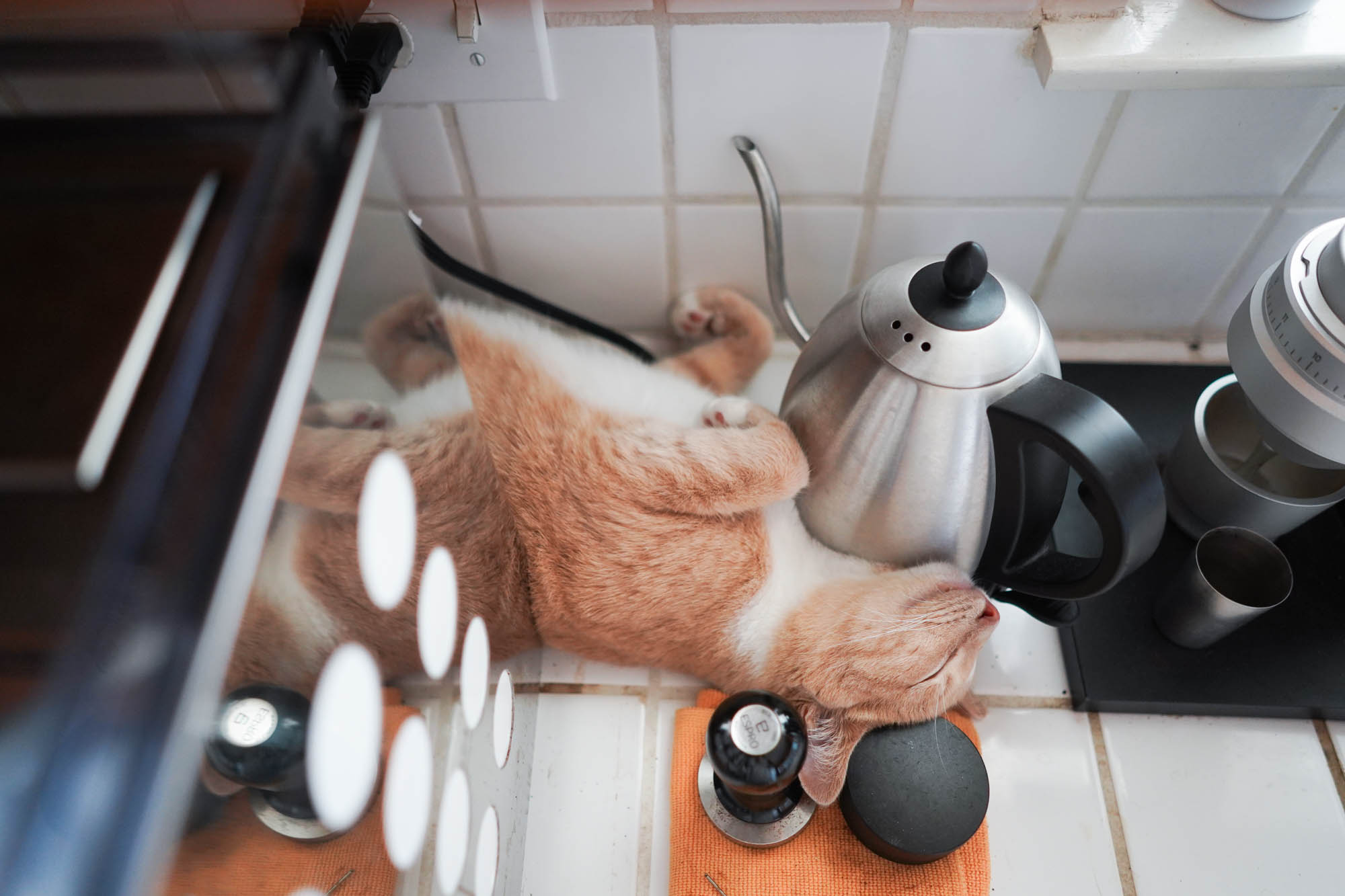
We’ve been proud cat parents of an adopted fur baby for about four years now and are no strangers to scooping cat litter. We reviewed the Litter-Robot 3 after using it for many years and reviewed the upgraded Litter-Robot 4 as soon as we could get it in our hands after testing many other brands of automatic litter boxes in the past. You can see all of our cat and pet product reviews here.
What is a Litter-Robot?
If you’re not familiar, the Litter-Robot is a self-cleaning litter box that automatically scoops dirty litter whenever your cat relieves itself. The machine rotates to sift out the clumped litter, putting it into a waste drawer, then sifts back in the unused litter into the box. The Litter-Robot sets itself apart with its sleek design, quiet scooping features, wifi connectivity and custom mobile phone app.
Litter-Robot 4 vs. 3 feature comparison table
| Litter-Robot 4 | Litter-Robot 3 Connect | |
|---|---|---|
| Price | $699 from Litter-Robot | $549 from Litter-Robot |
| Overall dimensions (H x W x D) | 29.5” x 22” x 27” | 29.5” x 24.25” x 27” |
| Entryway size | 15.75” x 15.75” | 15.5” x 10.25” |
| Height from floor to step | 4.5” | 6.3” |
| Height from floor to entryway | 12” | 13.4” |
| Control panel | On the top of the bonnet | On the base of the machine |
| Sensors | Laser & weight-based sensors (curtain sensor & SmartScale sensor) Drawer full indicator - advanced distance sensor for accurate litter levels | Weight sensor Drawer full indicator - infrared sensor |
| Safety detection | OmniSense™ SafeCat system (entry motion sensor, weight scale inside globe, cat presence sensors) Anti-pinch safety feature Overload detection | Cat sensor (weight on platform step & inside the globe) Anti-pinch safety feature Overload detection |
| Litter-Robot activation | Entry motion sensor, stepping on the platform, & SmartScale sensors inside the globe | Weight on platform step & inside the globe |
| Anti-odor protection | Advanced odor protection (tightly sealed waste drawer) Carbon filter OdorTrap pack | Enclosed waste drawer Carbon filter OdorTrap pack |
| Cycle timer settings | 3, 7, 15, 25, or 30 minutes | 3, 7, or 15 minutes |
| QuietSift cleaning | Yes | No |
| SmartScale technology | Yes | No |
| Whisker app features | Litter-Robot usage history Control panel access & lockout SmartScale sensors & cat specific weight measurements OmniSense detection (real-time litter and waste levels) | Litter-Robot usage history Control panel access & lockout Waste basket levels |
| Minimum cat weight | 3 lb minimum | 5 lb minimum |
| Colors available | Black or white | Grey or beige |
| MultiCat Design | Up to 4 cats per household | Up to 3 cats per household |
Design
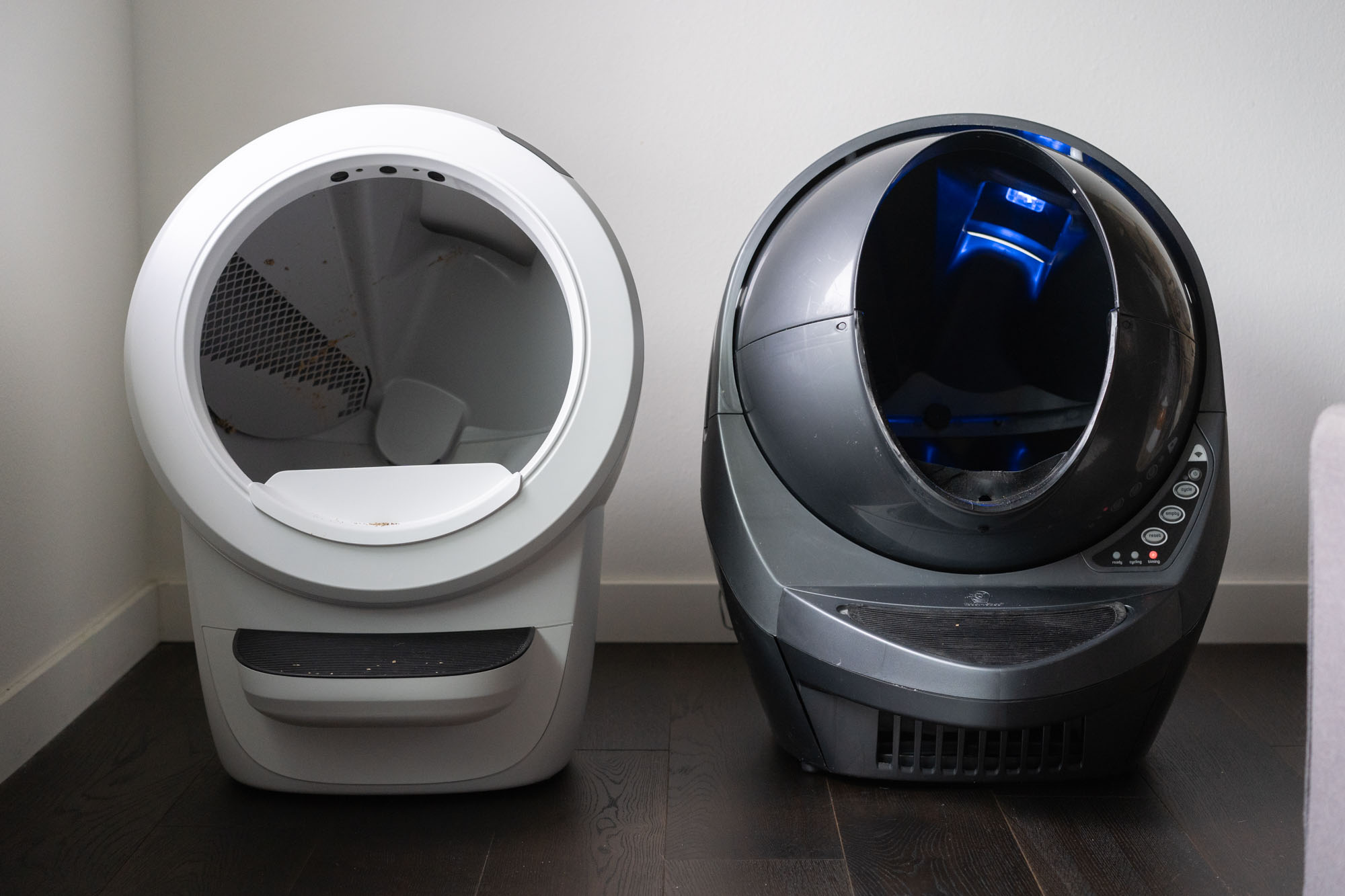
The Litter-Robot 4 has a clean and modernized design we like a lot better.
The first noticeable difference between the Litter-Robot 3 Connect and the Litter-Robot 4 is the design. Where the former tends to look like a bulky spaceship, the Litter-Robot 4 has a sleeker and minimalist aesthetic that fits most homes. The Litter-Robot 3 Connect comes in gray or beige colors, while the Litter-Robot 4 comes in black or white (a small detail we prefer because the colors look more modern).
Over time there will be more kitty litter that eventually settles all around the unit, and the Litter-Robot 4 is a little more seamless in terms of number of panels to wipe down.
Overall dimensions & entrance dimensions
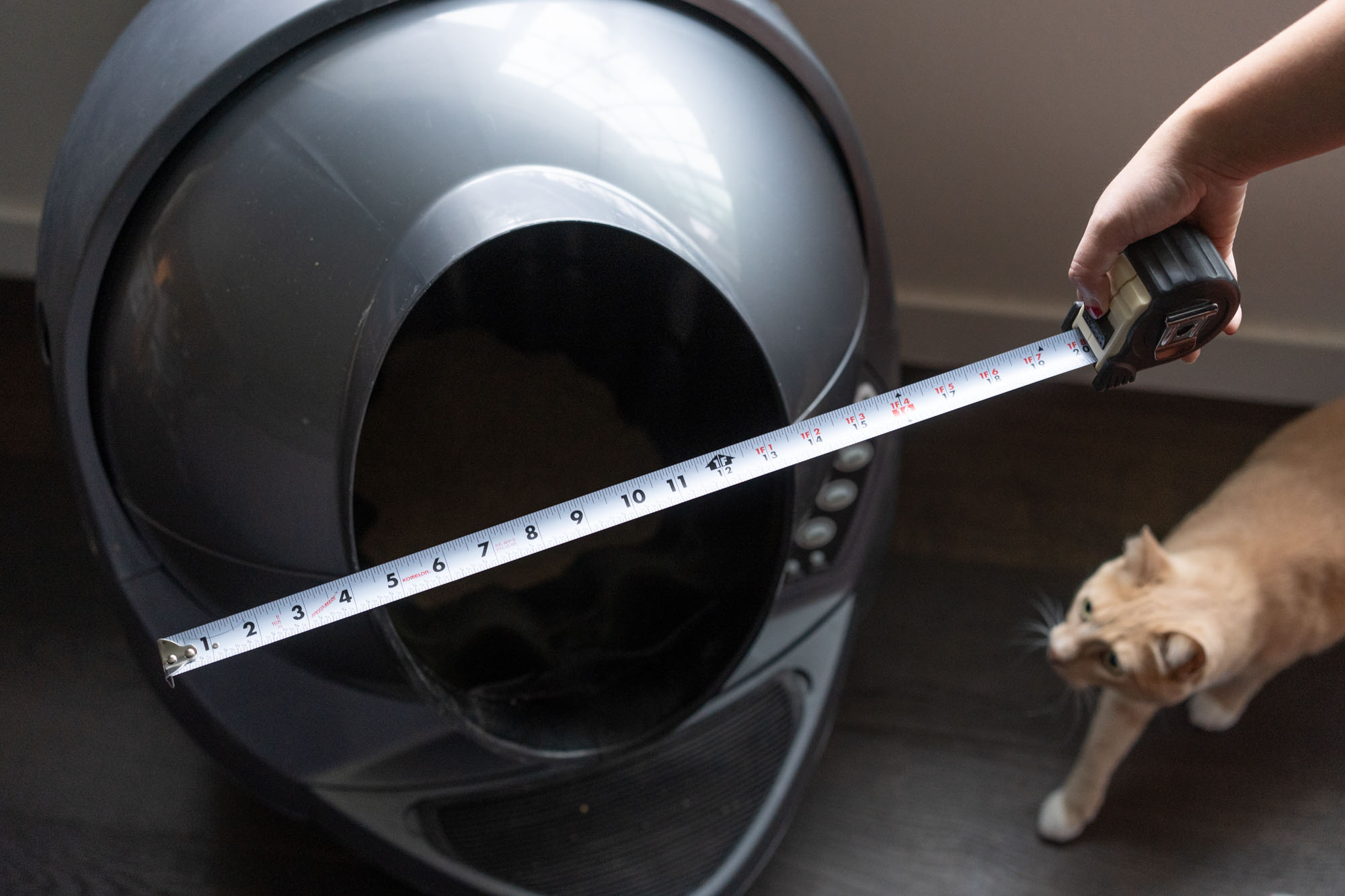
The Litter-Robot 4 wins with a smaller footprint, and larger entrance.
Although both machines weigh 24 lb, the Litter-Robot 4 has smaller overall dimensions of 29.5” x 22” x 27” (height x width x depth). The Litter-Robot 3 Connect is 2.25 inches wider at 29.5” x 24.25” x 27”. One of the main differences in design is the size and shape of the entrance. The newer iteration of the Litter-Robot has a circular opening that’s 15.75” x 15.75”, whereas the Litter-Robot 3 Connect has an oval-shaped entrance that’s 15.5” high by 10.25” wide. If you’ve got larger cats, we recommend the wider entrance of the Litter-Robot 4.
There are also differences in the height from the floor to the entrance of each Litter-Robot. The Litter-Robot 3 Connect has a 13.4” height, and the Litter-Robot 4 has a height difference of 12”. Each litter box has a platform below the entrance to help the cat enter. If you have a senior or larger cat with mobility issues, you can buy a ramp for the Litter-Robot 3 to help them reach the entrance. Note that the ramp for the Litter-Robot 4 won’t be available until 2023.
Sensors: safety and health
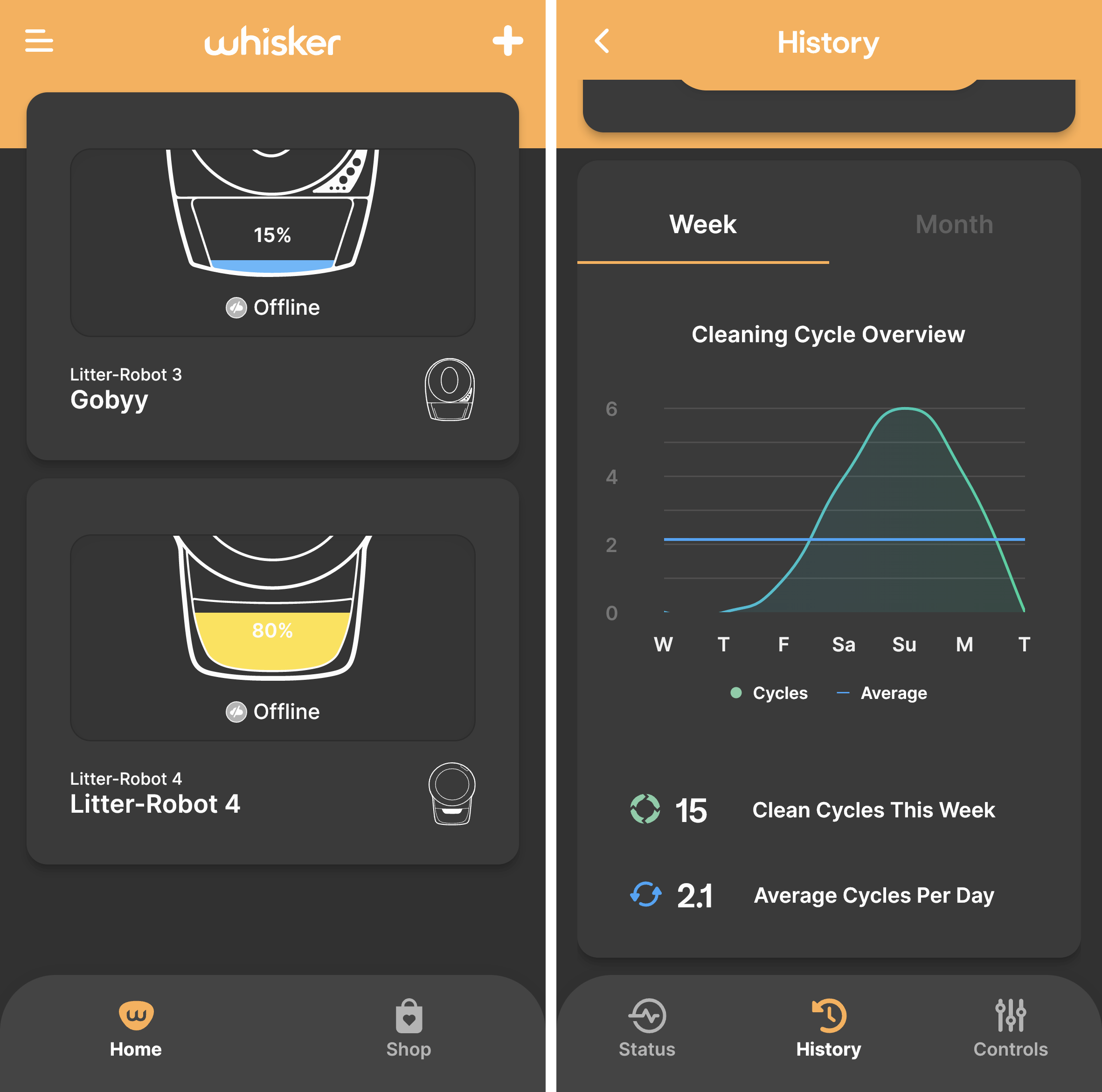
Both machines’ sensors are similar, but the Litter-Robot 4 adds a feature to measure and track your cat’s weight.
The Litter-Robot 3 Connect has a Cat Sensor that primarily uses your cat’s weight to indicate when your cat steps on the platform or enters the globe. For safety reasons, each cat must weigh at least five pounds to use the Litter-Robot 3 Connect. We noticed that the noisy cycle cleaning would intrigue our cat, and he would step on the platform at the start of cleaning, interrupting and pausing the cycle.
The newer Litter-Robot 4 has laser and weight sensors that help keep your cat safe and they also give you updates on your cat’s health (like their weight and litter box usage). The OmniSense™ detection laser-based sensors help you know when your cat enters the litter box and give you real-time litter levels and waste drawer levels–so you have all this information at the palm of your hands with the Whisker mobile app.
The Litter-Robot 4 also has weight sensors that differ from the Litter-Robot 3 Connect in that it offers litter box activity and will also weigh your cat whenever it uses the litter box. Your cat’s weight is sent to the Whisker app so you can monitor their weight along with your cat’s litter box history. We like that we can get more health information from this new model.
However, we have noticed that the sensors are somewhat more sensitive and see that the cycles get interrupted at least once a day. We also think that the laser sensors are a bit fussy when giving us litter levels, but this also may be due to the lighter-weight wheat litter we use.
Noise when “scooping” & sifting
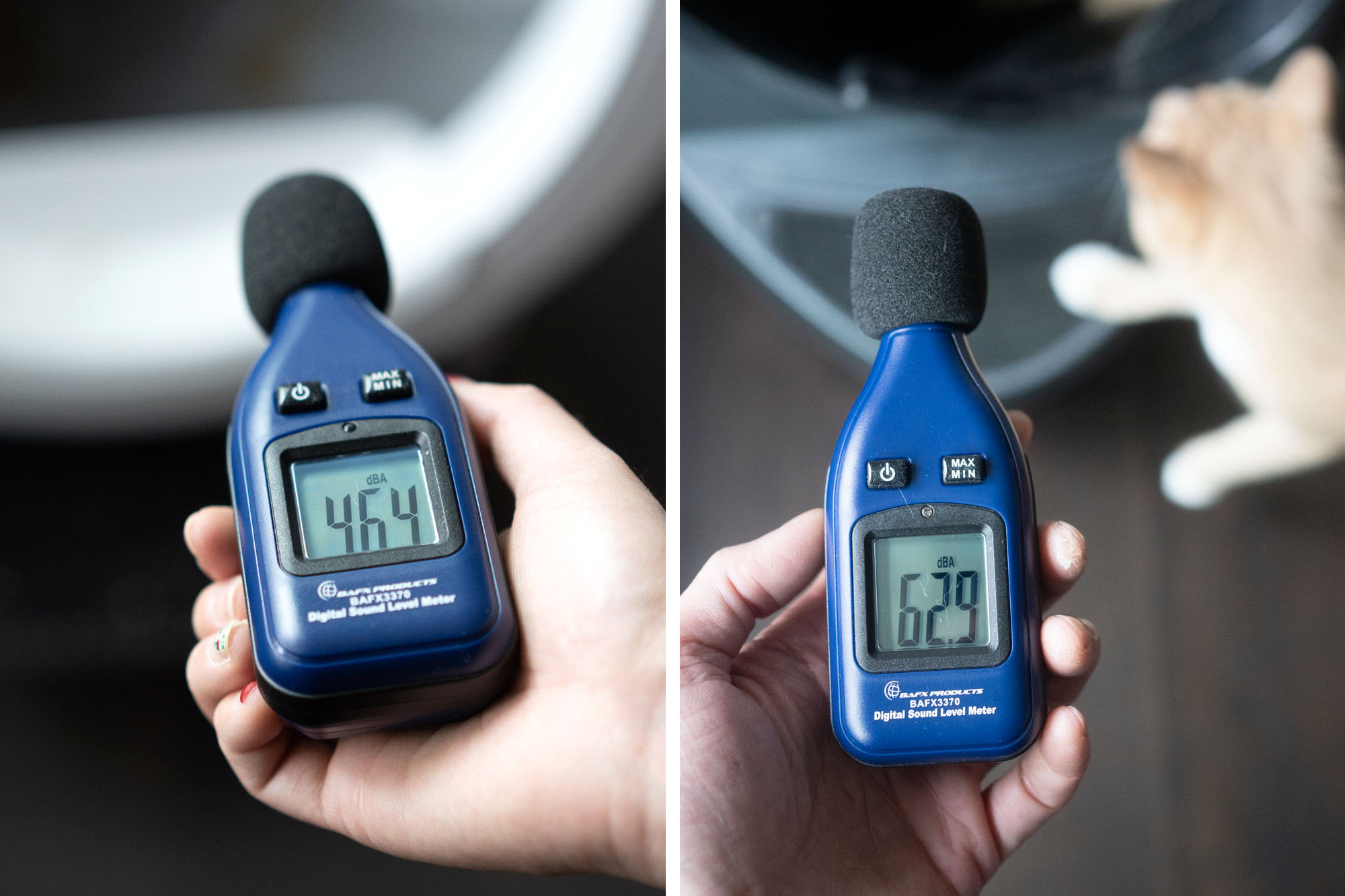
The Litter-Robot 4 wins as the MUCH quieter machine.
We used a digital sound level meter to give you some concrete results, held about 20″ away from the litter box as we ran the scoop/sifting cycle. The ambient noise level in the room was 38 dBA. The Litter-Robot 3 Connect measured approximately 60-62 dBA average during the litter sifting cycle with a high of about 65 dBA. By comparison, the Litter-Robot 4 measurured much lower at an average of 40-55 dBA with a max of about 59 dBA.
| Litter-Robot 3 | Litter-Robot 4 | |
|---|---|---|
| Scoop cycle avg. dBA | 60-62 | 40-55 |
| Scoop cycle max dBA | 65 | 59 |
The Litter-Robot 4 is quiet enough to not startle or intrigue our cat during the cleaning cycle like the Litter-Robot 3 Connect. The Litter-Robot 3 Connect makes a very obvious sounding motor rotation noise when it runs a cycle. We can hear the cycling from the bedroom one room away. However, it was never loud enough to be alarming or startling.
But it is shocking how quiet the Litter-Robot 4 is by comparison–there’s barely any noise. This softer sound is due to the new QuietSift™ patented technology that produces WhisperQuiet™ sifting noise when cleaning. We noticed that the sound from the brushes cleaning the machine during the cycle is louder than the actual motor. We appreciate this new tech because we don’t hear the device throughout the day, and it’s less distracting for our cat.
Machine setup, wifi & app connection
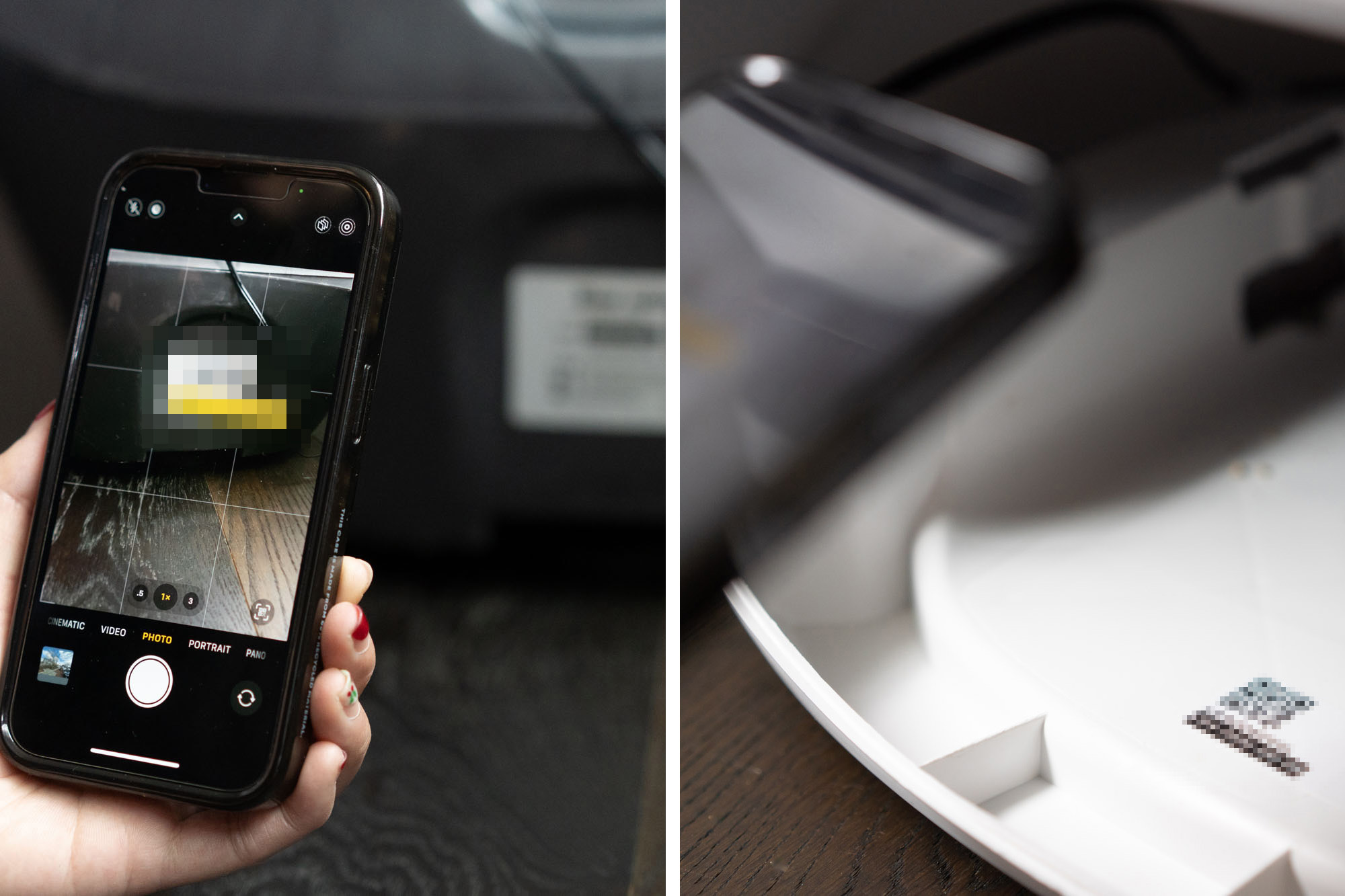
The Litter-Robot 4 wins this one, even if it’s a small detail.
Both the Litter-Robot 3 Connect and 4 came fully assembled out of the box, and we just needed to follow Whisker’s set-up instructions on how to start the machine. Connecting them to the custom Whisker app was the only slightly tricky part of setting up either machine.
The Litter-Robot 3 Connect only had the QR code in the lower back in a very hard-to-scan spot. We have our machine in a tight spot, so setup (and subsequent re-connections) required pulling out the device, which wasn’t great because the machine was dirty.
The Litter-Robot 4 has a QR code showing when you pull out the litter tray, which makes way more sense. It’s interesting we just happened upon this code because the instruction manual still says it’s only in the back of the machine.
Waste drawers
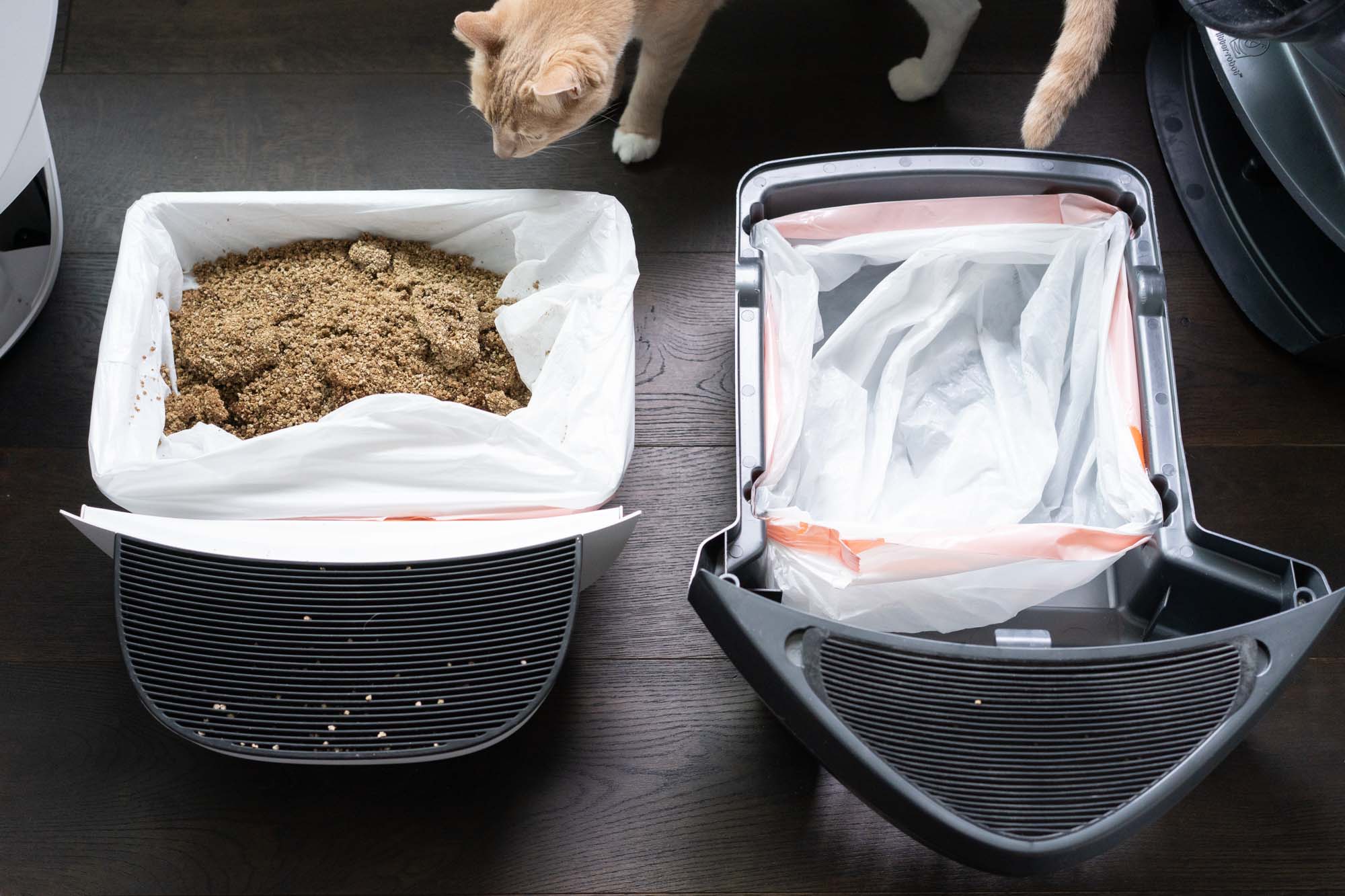
The Litter-Robot 4 wins this category.
The Litter-Robot 3 Connect has a Drawer Full Indicator that uses infrared emitters and sensors to let us know when the device is full. We were often notified by the app once a week that we needed to change out the waste bag, but once we opened the drawer, there was still a lot of empty space left.
Due to the design, the dirty litter would frequently pile up in the center of the waste drawer. This pile alerted the machine that it was full even when there was plenty of empty space on the sides. We would need to either change out the bag or push dirty litter to the sides to reduce the number of garbage bags we used.
With the Litter-Robot 4, Whisker redesigned the waste drawer shape and added a new distance sensor that better notifies us when the waste drawer is full. The Litter-Robot 4 waste drawer is rectangular, less deep, and slightly wider. We’re notified of a full waste drawer about once every 7-10 days for one cat, and the drawer is full compared to the empty spaces in the Litter-Robot 3 drawer. Another distinct design change of the new unit is it’s designed to have the bag completely cover the waste drawer, whereas in the 3 the bag clips are inside the drawer–which meant sometimes litter fell onto the edges of the bag when sifting and missed the bag. On the Litter-Robot 4 it seems to catch the waste better, with no noticeable increase in litter falling outside of the drawer into the base of the unit.
The new redesign also reduces the time we need to clean up litter bags. If you have extra cash burning a hole in your pocket and want bags that fit the waste drawers perfectly you can spend between 55 cents to $1 buying them from Litter-Robot. However, even with this new size and shape drawer on the updated unit, it still fits the same Kirkland garbage bag size running us about 17.5 cents per bag. Litter-Robot recommends using 9-11 gallon waste bags, but we use 10-13, and they fit just fine.
Litter tracking / scatter
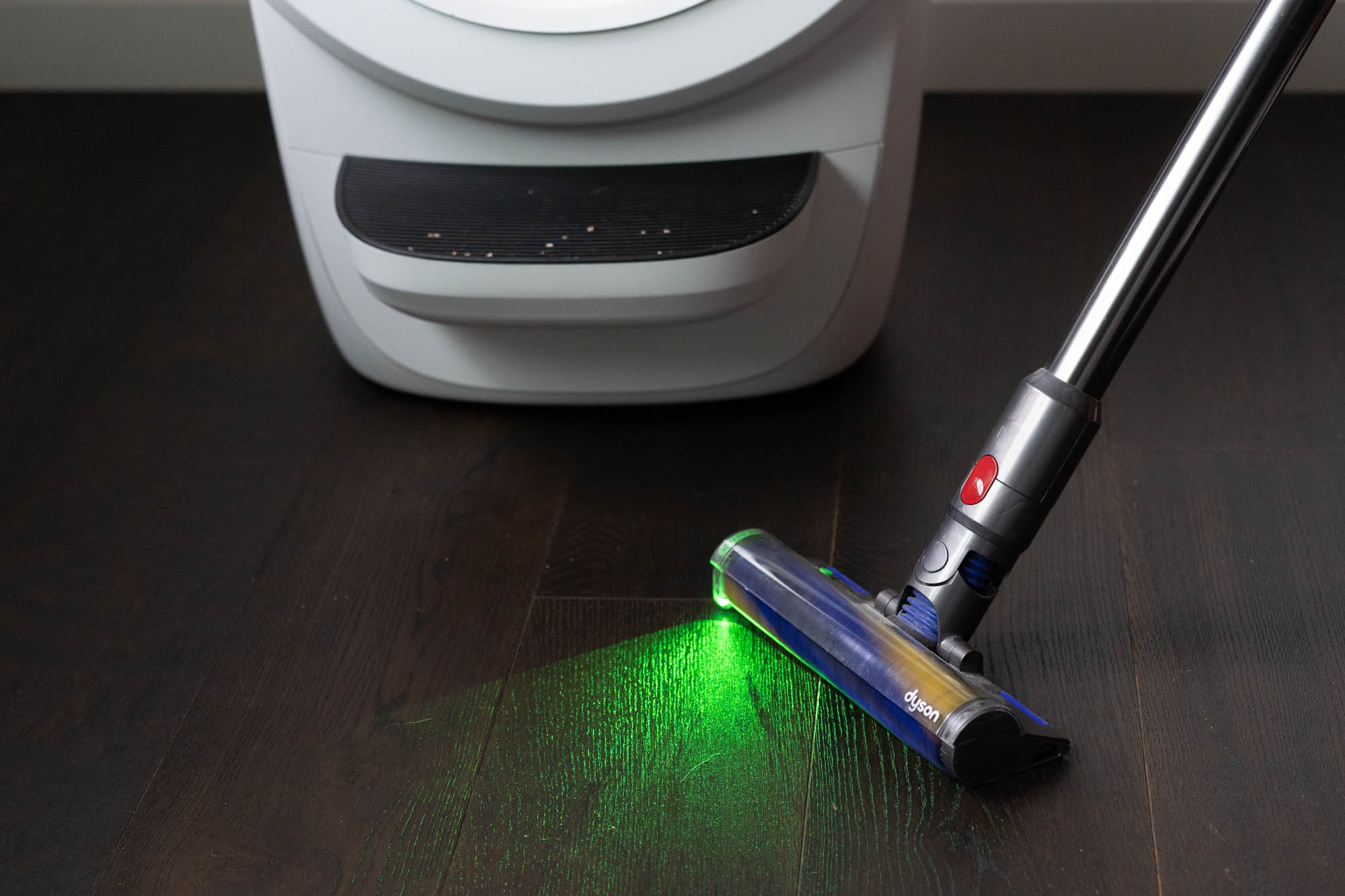
The Litter-Robot 4 wins this one, but we’re not sure how it achieves it.
When using the Litter-Robot 3 Connect, we noticed an equal amount of litter tracking as our manual litter box, even with additional accessories like the fence and ramp. After trying out many litter mats, this helped reduce the amount of scatter.
After using the Litter-Robot 4 for six months with the included fence attachment, we noticed less litter scattered outside the litter box and throughout the house. While we can’t entirely be sure why this has changed, we think it may be the device’s different design, especially the step platform. We noticed a lot more litter accumulating on the step platform than on the litter mat and the floor. However, it’s important to understand that litter tracking is completely normal in cat behaviors and varies between cats.
No matter what machine you use, or what litter you use, we’ve always experienced some litter tracking. We actually mounted a cordless vacuum nearby (from our lightweight vacuum review) to do a quick cleanup daily.
Cleaning the machines
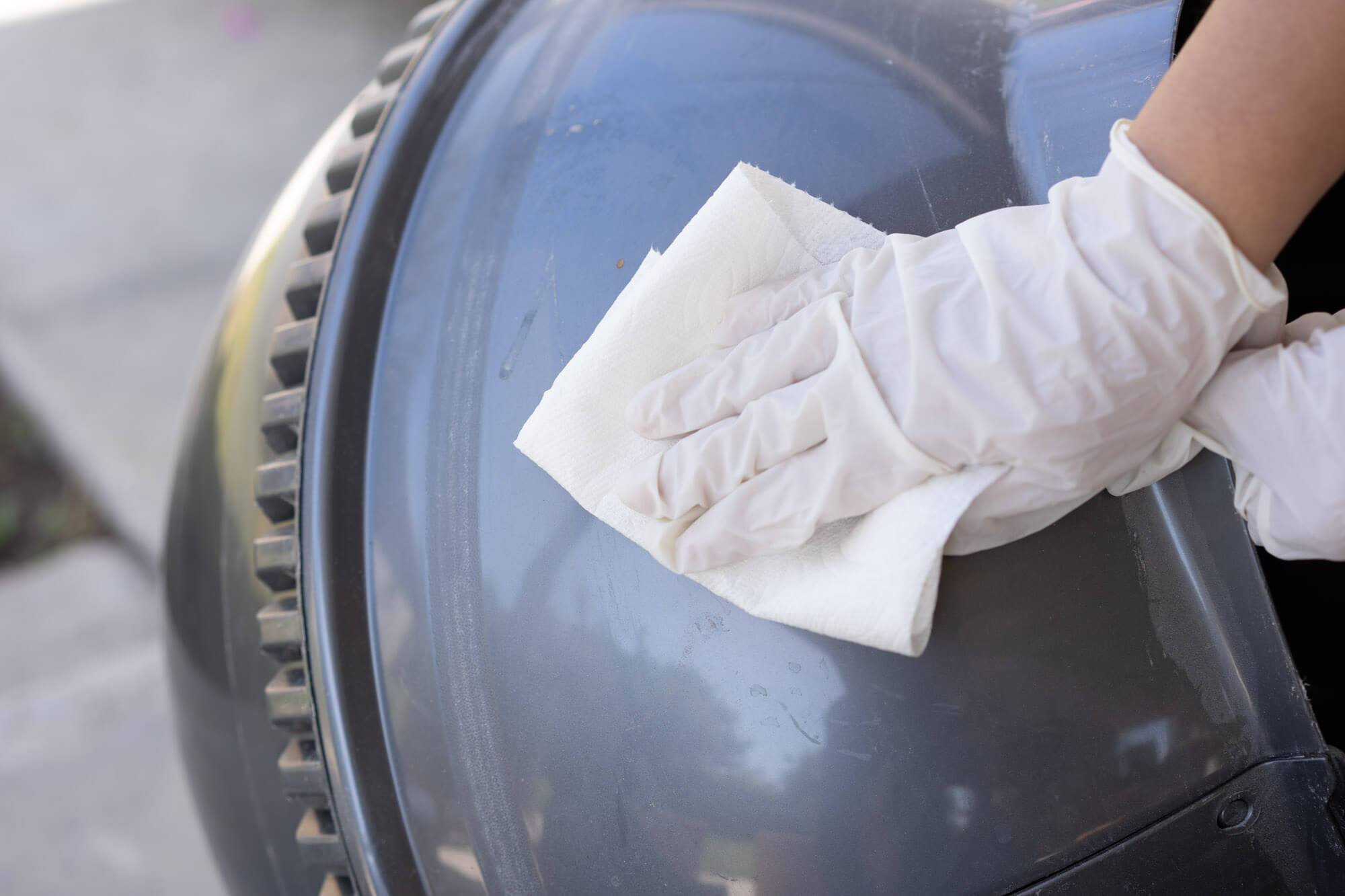
Litter-Robot recommends cleaning the globe portion of the machine every one to three months, but this entirely depends on how many cats use the litter box and how messy it becomes. For both the Litter-Robot 3 Connect and Litter-Robot 4, the cleaning experiences were similar because the parts are similar–a globe that can be hosed down and a more sensitive bonnet and base with electronic control panels and wires.
Before cleaning anything, we recommend reading the Litter-Robot manuals to avoid damaging your machine. In between deep cleanings, you can easily do wipe-downs on the outer parts of the machine or change out waste drawer liners when it’s full. Deep cleaning both machines take an hour or two of your time because the base and the bonnet can only be wiped down with towels and cleaning sprays due to the fragile electronic parts. There are also many small crevices to vacuum in both variations.
Overall experiences
After using the Litter-Robot 4 for over six months, we like this machine’s new additions and redesign. Compared to the Litter-Robot 3 Connect, this new iteration is quieter, helps notify us of our cat’s weight, and reduces the number of times we tend to the waste drawer.
Even though both devices look like large litter boxes, the new redesign is also a more minimalist and sleeker design. While we loved using the Litter-Robot 3 Connect, we can’t deny it’s a large eyesore that we pushed towards the corner of our laundry room. Whisker also sells furniture that hides the Litter-Robot 3 Connect too, if you want to disguise the machine in your home.
Conclusion: Is the Litter-Robot 4 worth the cost?
The Litter-Robot family is a luxury item that will help lessen the load of scooping up kitty litter, so we can assume it’s not necessary for some cat parents. At $549, the Litter-Robot 3 Connect is already a high-priced item and we still think it’s a great automatic litter box option to have compared to any manual scooping setup. The Litter-Robot 4 makes many small improvements across the board which are arguably all nice to have but not essential. If you can afford the price increase, we think the Litter-Robot 4 is worthwhile.
More Reviews
Igloo - Playmate 30 Can
The 10 Best Curling Irons for Thick Hair
BIO IONIC - Long Barrel Curling Iron 1.25' NanoIonic MX
The 8 Best Dog Shedding Brushes
Hertzko Self-Cleaning Brush
The 11 Best Fanny Packs & Belt Bags
Wandrd - Toiletry Bag in Medium
SmartCat - Ultimate Scratching Post
The 7 Best Mops For Laminate Floors
O-Cedar ProMist MAX
The 9 Best Mops For Hardwood Floors
Rubbermaid - Reveal Spray Mop
Stewart - Pro-Treat
Castor & Pollux - Organix
Healthy Paws





